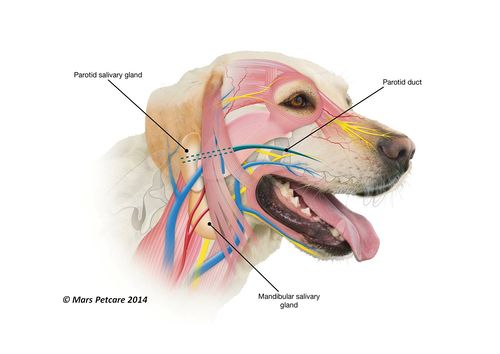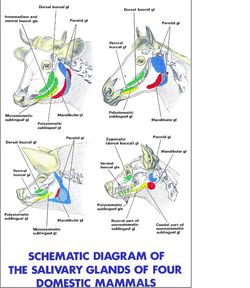Difference between revisions of "Salivary Glands Overview - Anatomy & Physiology"
Fiorecastro (talk | contribs) |
Fiorecastro (talk | contribs) |
||
| (One intermediate revision by the same user not shown) | |||
| Line 56: | Line 56: | ||
==Webinars== | ==Webinars== | ||
| − | <rss max="10" highlight="none">https://www.thewebinarvet.com/gastroenterology-and-nutrition/webinars/feed</rss> | + | <rss max="10" filter="salicary-glands" highlight="none">https://www.thewebinarvet.com/gastroenterology-and-nutrition/webinars/feed</rss> |
[[Category:Salivary Glands - Anatomy & Physiology]] | [[Category:Salivary Glands - Anatomy & Physiology]] | ||
[[Category:A&P Done]] | [[Category:A&P Done]] | ||
Revision as of 16:57, 7 November 2022
Introduction
The oral cavity is drained by numerous salivary glands. The saliva secreted keeps the mouth moist and facilitates mastication by lubricating the passage of the bolus.
Salivary glands are present in the cheek, tongue, lips, oesophagus, soft palate and pharynx but the major salivary glands are located further away from the oral cavity and function through connective ducts.
Saliva provides digestive enzymes, is a route of excretion of substances which accumulate on the teeth and provides lubricative and also cleansing functions. Salivary glands can produce a serous secretion, a mucous secretion or both.
Types of Salivary Glands
Major Salivary Glands
Parotid (glandula parotis), Mandibular (glandula mandibularis), Sublingual (glandula sublinguales) and Zygomatic (glandula zygomatica).
Minor Salivary Glands
Labial, Lingual, Buccal and Palatine.
Innervation
The salivary glands are innervated by sympathetic- Vasoconstriction occurs and the flow of saliva is decreased.
The salivary glands are also innervated by parasympathetic (most important)- They travel from the brainstem by the facial (CN VII) and glossopharyngeal (CN IX) then into branches of the trigeminal nerve (CN V). The flow of salivary fluid increases and vasodilation occurs.
The main nerves are the occulomotor (CN III), facial (CN VII), glossopharyngeal (CN IX) and vagus (CN X).
Saliva
Saliva is mainly water and contains amylase for carbohydrate digestion, salt- mainly sodium bicarbonate, mucin, electrolytes, antimicrobial agents and lingual lipase.
Species Differences
Equine
Produce up to 40L per day.
Bovine
Produce 110-180L per day.
Porcine
Produce up to 15L per day.
Links
Click here for information on Salivary Glands Pathology
| Salivary Glands Overview - Anatomy & Physiology Learning Resources | |
|---|---|
To reach the Vetstream content, please select |
Canis, Felis, Lapis or Equis |
 Test your knowledge using drag and drop boxes |
Salivary Glands Histology Activity |
 Test your knowledge using flashcard type questions |
Salivary Gland Anatomy & Physiology Flashcards |
 Selection of relevant videos |
Lateral surface of the head of the dog potcast Lateral surface and sagittal section of the head of a sheep Lateral surface of the head of the dog potcast 4 Lateral surface of the head of the dog potcast 6 |
 Selection of relevant PowerPoint tutorials |
Oral Cavity Histology, see part 2 for salivary glands |
Webinars
Failed to load RSS feed from https://www.thewebinarvet.com/gastroenterology-and-nutrition/webinars/feed: Error parsing XML for RSS

